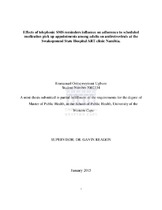| dc.contributor.advisor | Reagon, Gavin | |
| dc.contributor.author | Ugburo, Emmanuel Oritseweyinmi | |
| dc.date.accessioned | 2016-01-20T11:09:03Z | |
| dc.date.available | 2016-01-20T11:09:03Z | |
| dc.date.issued | 2015 | |
| dc.identifier.uri | http://hdl.handle.net/11394/4735 | |
| dc.description | Magister Public Health - MPH | en_US |
| dc.description.abstract | Background: Adherence of patients on antiretroviral therapy to lifelong treatment is a major challenge within the public health system in Namibia. Missed appointments have been shown to contribute to poor clinical outcomes and treatment failure, which may necessitate switching to more expensive antiretroviral regimens. In resource limited settings monitoring of appointments for antiretroviral medication pick up is a documented and feasible method for assessing minimum levels of adherence to antiretroviral medication. Aim: This study was aimed at evaluating the effects of telephonic short message service reminders influence on adherence to scheduled antiretroviral medication pick up appointments. It was also aimed at evaluating how socio-demographic parameters might moderate the effectiveness of short message service reminders. Study design: A randomized double blind controlled study design was employed. Methodology: Stable patients attending the ART clinic were recruited and randomly assigned to either an intervention or control group, until the sample size of 398 was reached in the two arms of the study. The study populations were adult patients’ ≥ 18 years who have been enrolled on treatment for ≥ 3months. The intervention group received an unasked for single short message service reminder, sent 48 hours before their scheduled appointments and continued with standard care, while the control group received standard care without any reminder. The study participants were blinded to their study group. Also, research assistants involved in collecting baseline and outcome data were blinded to study participants study group. Baseline data was collected through a structured questionnaire. Study participants were followed up for four consecutive scheduled ARV pick up appointments. The following outcome data were collected at each follow up visit; number of days late after scheduled appointment, adherence measured by pill count and 3 days self-report recall of adherence. Main results: The pre-intervention survey revealed that only 60% of the study participants were willing to be reminded of their medication pick up appointment. Overall, the SMS reminder improved adherence to medication pick up appointments by 1.6 times as compared to no reminder and also reduced the risk of missing medication pick appointments by 22% as compared to no SMS reminder. Study participants that received a reminder were also two times more likely to achieve optimal adherence to their medication, compared to those who received no reminder. The SMS reminder improved adherence to antiretroviral medication by 11% in this study, while the mean difference in the number of days late to collect antiretroviral medication was significantly reduced by about 4 days by the intervention. Participants that are employed were more likely to adhere to antiretroviral medications as compared to the unemployed. Ironically participants that were on ART for less than one year and those that had treatment supporters reminding them of their medication appointments were significantly less likely to honour their medication pick up appointments. Conclusion: Being employed was significantly associated with attaining optimal adherence to antiretroviral medication. There were no other significant associations between the patients socio- economic and demographic characteristics and adherence to scheduled medication pick up appointments, or to adherence to medication. Recommendations: The Ministry of Health and Social Services should consider rolling out SMS reminders to ART sites with similar settings as Swakopmund State Hospital ART Clinic. Patients that are willing to receive the reminder should be targeted in the scaling up of the roll out. Late and missed medication pick up appointments could be used as an easy proxy measurement for assessing adherence to ART. | en_US |
| dc.language.iso | en | en_US |
| dc.publisher | University of the Western Cape | en_US |
| dc.subject | Telephonic reminder | en_US |
| dc.subject | Antiretroviral therapy | en_US |
| dc.subject | SMS reminder | en_US |
| dc.subject | Pharmacy refill | en_US |
| dc.subject | HIV/AIDS | en_US |
| dc.title | Effects of telephonic SMS reminders influence on adherence to scheduled medication pick up appointments among adults on antiretrovirals at the Swakopmund State Hospital ART clinic Namibia | en_US |
| dc.rights.holder | University of the Western Cape | en_US |

